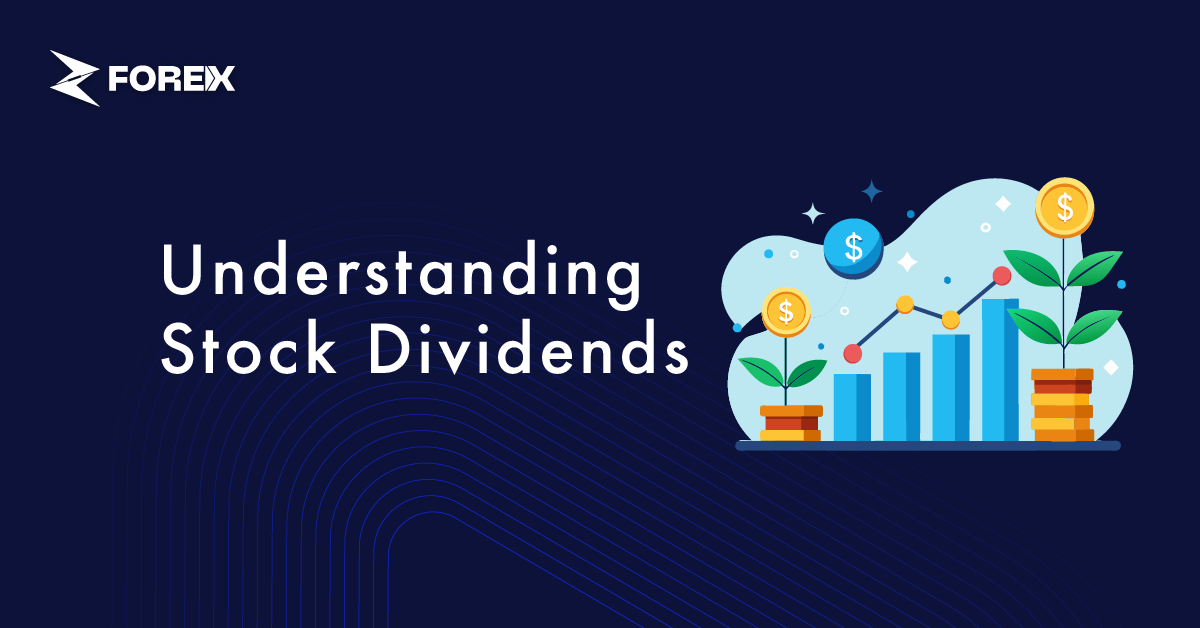
A term frequently encountered by investors, stock dividends are one of the most common methods for companies to share their profits with shareholders.
We will be exploring what stock dividends are, how they operate, what they mean for investors, and their role in the forex market.
A stock dividend is a method of profit-sharing where a company distributes a portion of its profits to its shareholders based on the number of shares they own. This distribution can be made in the form of cash or additional shares. Dividend payments give investors a way to directly participate in the company's profitability.
Companies typically invest a portion of their profits in their own growth and development, while another portion is shared with shareholders. The frequency and amount of dividend payments can vary depending on the company's financial health, growth prospects, and overall strategy. Some companies pay dividends regularly, while others do so less frequently.
There are two main types of stock dividends:
The process of dividend distribution generally involves several stages:
The company's board of directors decides to distribute dividends and announces this decision officially. This announcement includes the dividend amount, payment date, and record date for determining the shareholders eligible for the dividend.
Shareholders who wish to receive dividends must hold their shares until this date. The company uses this date to officially register those who have dividend rights.
After the record date, the company transfers the dividend amount to the investors' accounts. If the dividend is in cash, it is deposited into the investor's account; if it is a share dividend, additional shares are added to the investor's account.
When dividends are distributed, the company’s market value decreases because part of its cash assets is paid out to shareholders. This is reflected in the share price. For instance, if a company distributes a dividend of $5 per share, the share price typically drops by this amount. So, if the share price is $100, it may fall to $95 after the dividend is paid. If shares are purchased only for the purpose of receiving dividends, the decline in share price may result in losses.
Companies are not obligated to pay dividends regularly. If a company's financial condition worsens, it may reduce or eliminate dividend payments, leading to potential income loss for investors.
Dividend income is subject to taxation in many countries. Investors may need to pay taxes on the profit they earn from dividends.
Dividend Yield (%) = (Annual Dividend / Share Price) x 100
Dividend yield measures the amount of dividends an investor receives relative to the share price. The annual dividend is the total amount paid per share in a year, while the share price is the current market price of the stock.
This formula calculates the ratio of dividend amount to share price. A higher dividend yield may be attractive, but it does not guarantee the company's dividend policy is sustainable.
In the forex market, you can trade stocks using CFDs. This means you don't need to actually own the stock. You can still make money if the stock price goes up, and you can also get dividends.
Stock dividends can provide investors with regular income and the potential for long-term capital growth. However, when assessing the appeal of dividends, investors should consider not just the dividend yield but also the company’s financial stability and the sustainability of its dividend policy. By doing so, you can develop a more informed and profitable dividend strategy.
How often do companies pay dividends?
The frequency of dividend payments varies by company. Some companies pay dividends quarterly, while others may do so annually, semi-annually, or at irregular intervals. This timing is influenced by the company’s dividend policy and financial health.
Can dividend payments be guaranteed?
No, dividend payments are not guaranteed. Companies may reduce or stop dividend payments based on their financial performance and business conditions. It is important to evaluate the company's stability and dividend history before investing.
How do stock dividends affect my ownership in the company?
Stock dividends increase the number of shares you own but do not initially change the total value of your investment. The overall capital ratio remains the same, although the price per share usually adjusts to account for the additional shares.
Are dividend payments taxable?
Yes, dividend payments are subject to taxation in many countries. The tax rate and treatment of dividend income can vary based on local tax regulations and individual circumstances.
How does the dividend distribution process affect a company's stock price?
When dividends are distributed, the company’s stock price typically drops by the amount of the dividend. This happens because the company's market value decreases as cash or shares are distributed to shareholders.
What should investors consider when evaluating a company's dividend policy?
The company’s financial health, growth potential, and the sustainability of its dividend payments are among the factors investors should research beforehand. While regular dividends and a strong financial position can be favorable, it’s important to assess the overall stability and strategy of the company.
 Silver Rally Ahead? Supply Deficit Meets Rising Demand
Silver Rally Ahead? Supply Deficit Meets Rising Demand
A new silver rally may be forming as supply deficits deepen and China’s demand grows. Here’s what is driving the momentum.
Detail Fed Rate Cuts 2026: How to Position Now
Fed Rate Cuts 2026: How to Position Now
Fed rate cuts in 2026 could reshape markets. See expectations, asset impact, and positioning strategies for bonds, gold, stocks, and USD.
Detail Analyzing the U.S. Labor Market Outlook for 2026
Analyzing the U.S. Labor Market Outlook for 2026
Year’s first jobs report looked reassuring. A closer breakdown, however, tells a more layered story about the direction of the labor market.
DetailThen Join Our Telegram Channel and Subscribe Our Trading Signals Newsletter for Free!
Join Us On Telegram!